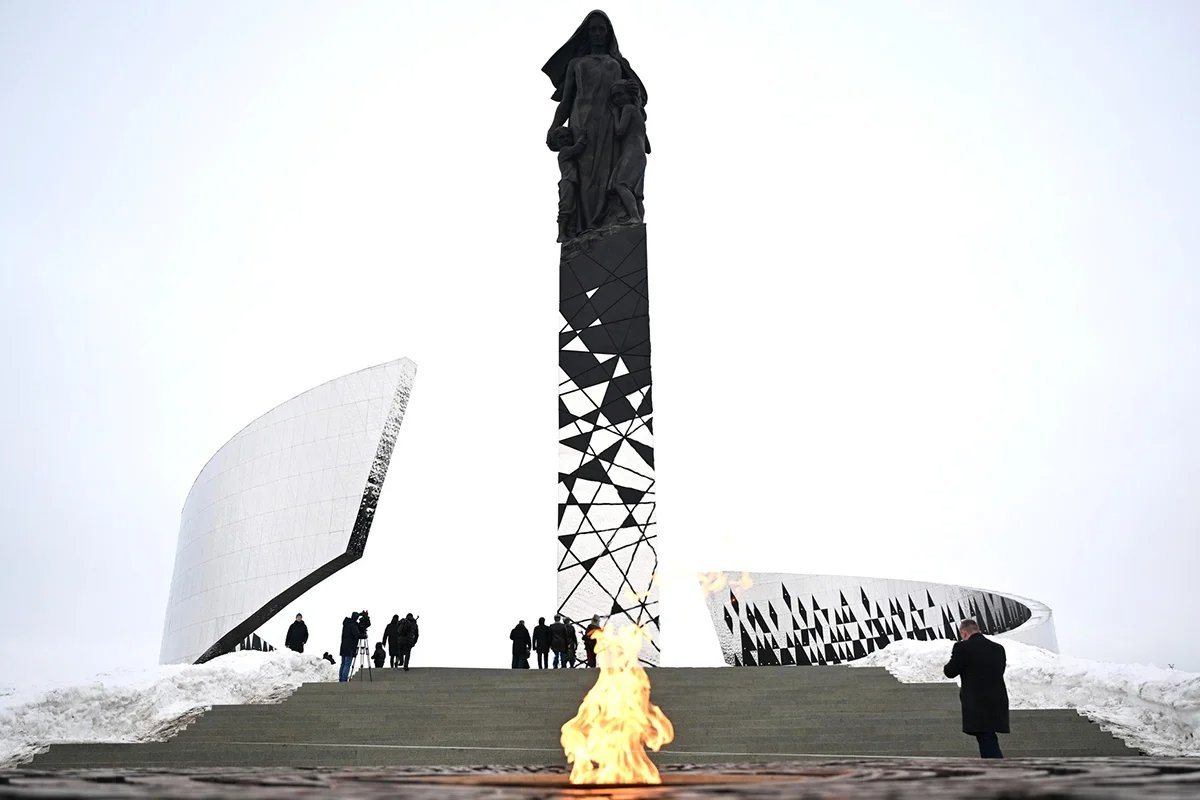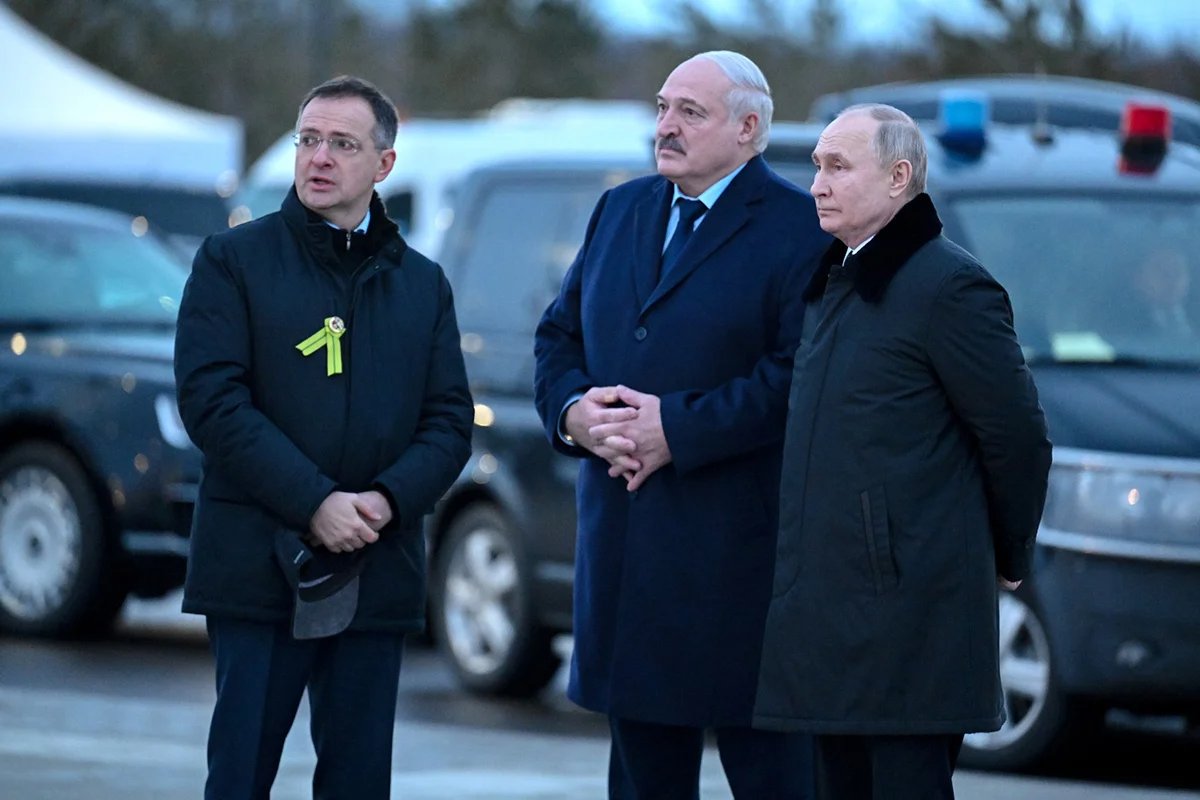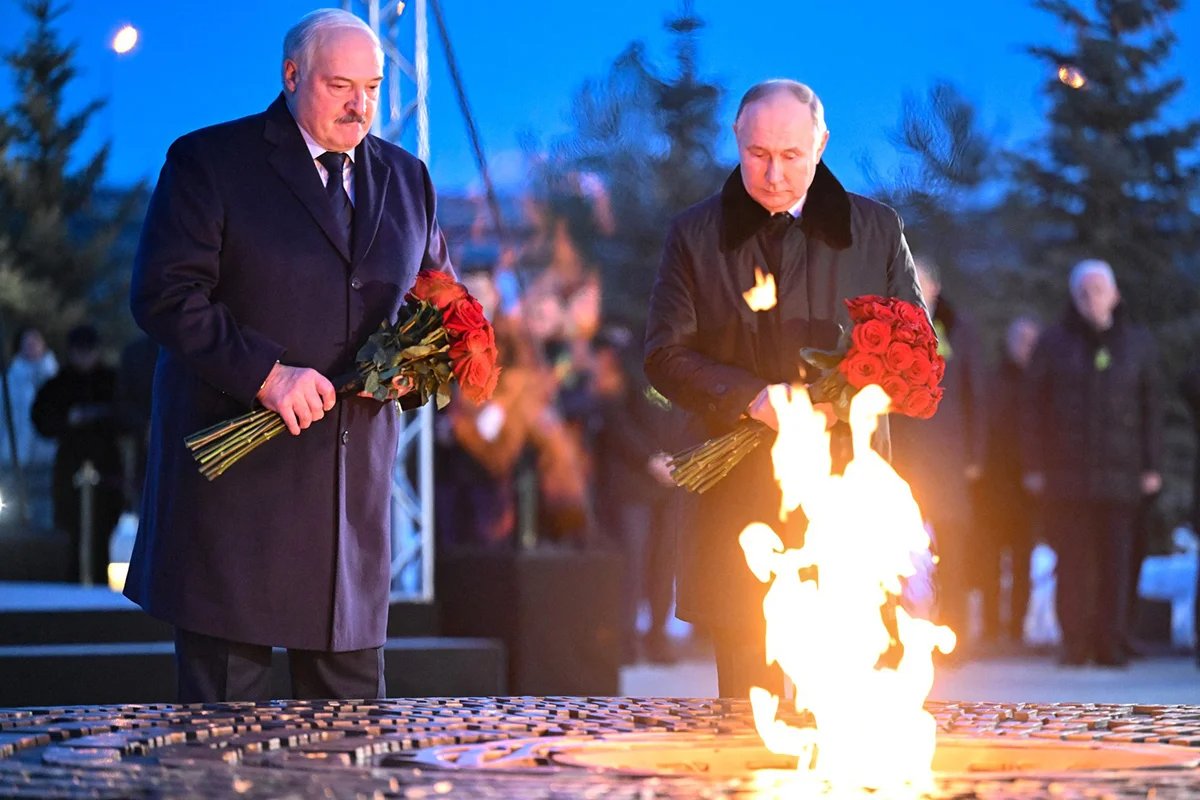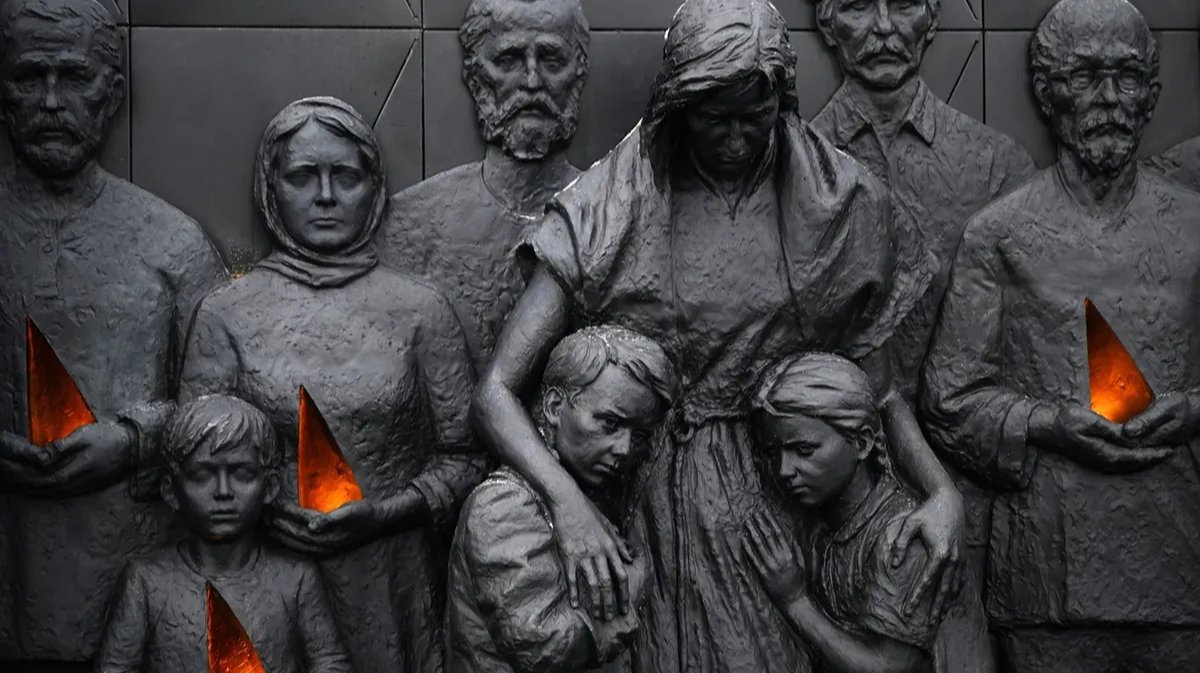Late last month, Russian President Vladimir Putin unveiled a vast new monument outside St. Petersburg to the Soviet victims of the Nazi genocide during the Great Patriotic War — Russia’s name for World War II. The memorial marks a decisive pivot in the Russian state’s attitude towards its own historical memory, and not only stresses Russians’ role as great heroes, but also as unavenged victims.
Demoting the Holocaust
Russia marks two solemn occasions on 27 January each year — the lifting of the siege of Leningrad in World War II and the International Day of Remembrance of the Victims of the Holocaust. Throughout the 2010s, the Russian authorities tried to link the largest war crime and the largest genocide in the history of World War II, emphasising unity in remembering distinct groups that fell victim of Nazi terror.
That is now all in the past. While in January last year Putin met with representatives of Russia’s Jewish community and spoke about the importance of remembering the Holocaust, at the unveiling of the memorial this year he referred only to the “genocide of the Soviet people” and promised those present that Russia would successfully eradicate Nazism from the modern world, pointing to both Ukraine and the Baltic states as hotbeds of the phenomenon.
In 2005, the United Nations General Assembly established 27 January as the International Day of Commemoration of Victims of the Holocaust as it was on that day in 1945 that the Red Army liberated Auschwitz, the Nazis’ largest death camp.
But the Holocaust no longer serves a useful purpose for the Russian authorities. Neither the Russian Historical Society nor the Russian Military Historical Society, two key bodies in determining state policy on remembering the past, mentioned it this year. In a statement marking the date, Vyacheslav Volodin, the Speaker of the State Duma, the lower house of Russian parliament, mentioned the Holocaust, but not the suffering of the Jewish people.
The Russian Foreign Ministry spokesperson, Maria Zakharova, recently repeated the idea that the Holocaust was not solely a Jewish tragedy, a manipulative reading of that same UN General Assembly resolution that includes acknowledgement of the fact that while persecuting the Jews, the Nazis also killed non-Jews.
But Russian diplomats have turned history on its head and moved closer to the position of Holocaust-deniers who believe that there was nothing exceptional in what the Nazis did to the Jews.

Memorial to Civilian Victims in the USSR of the Nazi Genocide during the Great Patriotic War. Photo: Pavel Bednyakov / RIA Novosti / Kremlin
Genocide as a tool
Until recently Holocaust remembrance was encouraged by the Russian authorities, who viewed it as a means to an end. Even through the 2010s, amid the elevation of the official myth of the Great Patriotic War, Holocaust remembrance continued to be necessary to ensure Israeli support, to remind the world of the Red Army’s heroism as the liberator of Auschwitz, and, by implying their collaboration, to undermine the reputation of Russia’s neighbours in the Baltic states and Ukraine.
But from 2020 on, the authorities began to foreground the concept of a “genocide of the Soviet people”, which portrays the Russian people as both the main victims of Nazism and its principal vanquishers.
After the Russian invasion of Ukraine, absurd parallels began to be drawn between it and World War II, with the war in Ukraine suddenly being described as a continuation of the Great Patriotic War being waged against the very same Nazis. While once a “Soviet genocide” threatened the country, that evolved to be a “Russian genocide”.
A closer look at Nazi crimes is revealing, however, of the unpleasant parallels between them and the Russians that emerge. The Nazis decimated their domestic opposition, promoted conspiracy theories about a “global financial elite” and persecuted homosexuals and Jehovah’s Witnesses. The Nazi leadership considered Poland to be an “artificial nation”, just as Russian propagandists view modern Ukraine.

Putin, Lukashenko and Chairman of the Russian Military Historical Society Vladimir Medinsky at the memorial unveiling. Photo: Dmitry Azarov / Kommersant / Kremlin
Background
The concept of the “genocide of the Soviet people” originated in the bowels of the Presidential Administration. I can testify to this personally as a former employee of the Russian Military Historical Society, which always opposed the concept and monitored its use closely.
From an academic point of view, the “genocide of the Soviet people” is both meaningless and counterproductive, as it reduces Nazi extermination policy to a uniform entity, rather than understanding the phenomenon’s complex details.
Genocide, as specified in the UN convention, implies the deliberate annihilation of a group of people based on certain criteria — racial, religious, ethnic or national. But there is another important condition too, namely, annihilating a group of people for who they are.
The Nazis exterminated Jews, Roma and people with disabilities on these grounds. In other cases, the primary reason was different, and gave rise to the concept of “crimes against humanity”. It doesn’t make the suffering of such victims any less significant, and it is inappropriate to talk about who suffered “more” or “less”, but an academic cannot fail to notice how different victims were subjected to distinct treatment by the perpetrator.
The authorities have come to espouse the “genocide of the Soviet people” gradually. Putin avoided using the term in 2020 and 2021, preferring more metaphorical language. In 2021, the chairman of the Russian Military Historical Society and author of the state’s new history textbook for schoolchildren, Vladimir Medinsky, published a major policy article arguing that the Nazi occupation didn’t meet the classical definition of genocide, and that therefore that definition should be expanded. He now questions why we used to hesitate over recognising the “genocide of the Soviet people”, even if three years ago it hadn’t been obvious to him either.
Whereas some historians had come out against the concept of a genocide of the Soviet people, that was before 24 February 2022. Since then, any public dissent even in matters that might not feel particularly political, has become fraught with potential consequences.

Putin and Lukashenko at the memorial unveiling. Photo: Dmitry Azarov / Kommersant / Kremlin
Heroes and victims
The concept of a “genocide of the Soviet people” is a dangerous one precisely as it makes a more thorough understanding of Nazi crimes impossible.
Awkward questions for the Soviet authorities such as how it could have subjected 70 million of its citizens to live under German occupation, or whether every possible measure had been taken to save the people of Leningrad from starvation in the winter of 1941, can now be conveniently answered with the phrase: “We had our own genocide.”
Having previously called upon the Russian people to focus on its heroism, the authorities have now decided to remind the Russian people that they were also victims, and the phrase “the genocide of the Soviet people” is repeated by politicians and state media outlets whenever Nazi crimes are mentioned.
It remains to be seen whether official recognition of the Soviet genocide will be the full extent of the matter or, as is already the case in Belarus, it will become a criminal offence to question term in Russia too? A date — 19 April — has already been set to mark the Soviet genocide, and last year the date was added to the official school history textbook. Now there is a memorial too.
Join us in rebuilding Novaya Gazeta Europe
The Russian government has banned independent media. We were forced to leave our country in order to keep doing our job, telling our readers about what is going on Russia, Ukraine and Europe.
We will continue fighting against warfare and dictatorship. We believe that freedom of speech is the most efficient antidote against tyranny. Support us financially to help us fight for peace and freedom.
By clicking the Support button, you agree to the processing of your personal data.
To cancel a regular donation, please write to [email protected]

